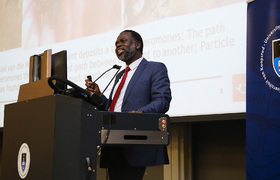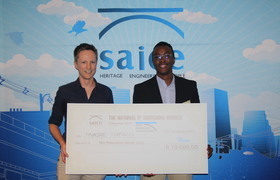Impacting Airbus aircraft design
28 November 2018 | Story Supplied. Photo Ben, Flickr. Read time 3 min.
University of Cape Town (UCT) researchers from the Industrial Computational Fluid Dynamics (InCFD) Research Group have made their mark in the field of international aircraft design, specifically the Airbus A320.
The group’s novel CFD software Elemental – with its unprecedented accuracy – enabled Airbus to effect a design improvement to their A320 aircraft that won the research team the Best Innovations in Flight Physics award for 2017/18.
Based in the Department of Mechanical Engineering, the InCFD research group is tasked with developing state-of-the-art CFD modelling technology and expertise to expressly support industry. Established in 2011 by Professor Arnaud Malan, its first task was to develop a new industrial strength Elemental CFD software version, which resulted in the awarding of the SARChI Chair in Industrial CFD in 2014.
Malan, who holds the SARChI Chair, worked on Elemental along with principal scientific officer Dr Leon Malan and postgraduate students Niran Ilangakoon and Bevan Jones. They cooperated with Francesco Gambioli, an expert in wing component loads, who managed the project for Airbus.
“Unprecedented accuracy”
“The unprecedented accuracy of Elemental allowed for a new level of understanding of fuel sloshing effects on the aircraft structure, resulting in a lighter and more optimised component of the inner fuel tank,” the professor explained.
“The unprecedented accuracy of Elemental allowed for a new level of understanding of fuel sloshing effects on the aircraft structure.”
The award, which attracted several nominations, is presented annually in recognition of the best innovations in flight physics across all Airbus initiatives in Europe, the United States and India. The winners are elected via voting by all Airbus employees across all disciplines, as well as the flight physics expert community.
About 800 Airbus physics engineers are eligible to participate.
Malan said the fuel sloshing analysis ranked highly in terms of the votes from both employees and the experts.
The award nomination pointed to the novel CFD software being instrumental to the project.
Malan said this was testament to his group’s motto of pursuing the development of state-of-the-art CFD tools for industry, “via fundamental research which carries the hallmark of excellence”
 This work is licensed under a Creative Commons Attribution-NoDerivatives 4.0 International License.
This work is licensed under a Creative Commons Attribution-NoDerivatives 4.0 International License.
Please view the republishing articles page for more information.










